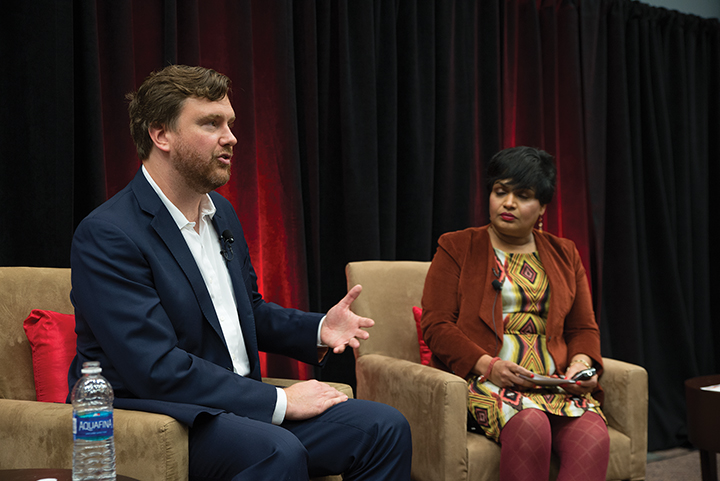By Jordan Fox
For The Diamondback
Though many criticize the Founding Fathers for owning slaves, the director of the Ed Snider Center for Enterprise and Markets is bothered by that judgment.
“We’re indicting our Founding Fathers for being slave owners, not recognizing that … you cannot with the hindsight of 200 or 300 years later, and the knowledge that we have today, go back and say, ‘Well you should have known this is wrong,'” Rajshree Agarwal said.
Greg Lukianoff, president and CEO of the Foundation for Individual Rights in Education, led a conversation about free speech, censorship and microaggressions on college campuses at the University of Maryland’s business school Tuesday.
Lukianoff said his mission is to educate and defend faculty and students’ rights to free speech — including Agarwal’s right to express her opinions about the Founding Fathers, no matter whether people disagree with her.
About 250 students and faculty members attended the event, titled “Assault in the Ivory Tower on the Market for Ideas,” which was hosted by the BB&T Colloquium in partnership with the Snider Center. The center was created two years ago through donations from Ed Snider, the former owner of the Philadelphia Flyers hockey team, and the Charles Koch Foundation.
The group discussed topics including the censorship of faculty, collective versus individual identity and mental health.
A 2010 survey by the Association of American Colleges and Universities found that students became more skeptical about whether it was safe to hold unpopular points of view between their freshman to senior years.
“We rely on our universities to be the engines of intellectual innovation, but it’s really hard to innovate if you’re afraid to open your mouth,” said Lukianoff, the co-author of the much-debated article in The Atlantic, “The Coddling of the American Mind.”
Registered attendees of the event answered a survey that included many of the points discussed.
Fifty percent of those surveyed agreed that “words are a form of violence and should be controlled by campus officials,” while 75 percent thought that “At college, I have had opportunities to engage in meaningful discussions with people who hold different views than I do.”
Additionally, 85 percent agreed with the statement: “I find value in other people’s opinions even if they are different than my own.”
Lukianoff said the results show that the university does not employ policies that restrict freedom of speech on the campus, something not reflected at many other universities.
Zeinab Karake, an information systems professor, said she attended the event because “job security is the key.”
“I truly believe in free speech, and I think that professors are the kings and queens of their classroom,” Karake said.
When people hold “beliefs like they are holding prejudices,” and “know [something] is true, but they can’t for the life of them explain why,” the process of learning from differing opinions is stunted, Lukianoff said.
“It is now very radical listening to people who disagree with you,” Lukianoff said.
Freshman finance major Aiden Gelb said the discussion was relevant to the election, too.
“It’s relevant with the whole ‘America is [becoming] too soft’ thing,” Gelb said. “It really hurts society if you don’t open up and talk about things.”
Ostracizing people you don’t agree with has been the trend for all of human history, but now it is time to “listen to the oddballs … because it can spark creativity, discussion and sometimes [show] the idea you were absolutely dead certain was wrong is actually right,” Lukianoff said.
Agarwal said the center invited Lukianoff to speak because, “ideas matter, good ideas and bad ideas.”
“What you should have is an active mind, and an active mind has opinions … but is always open to the opposite view,” Agarwal said.



